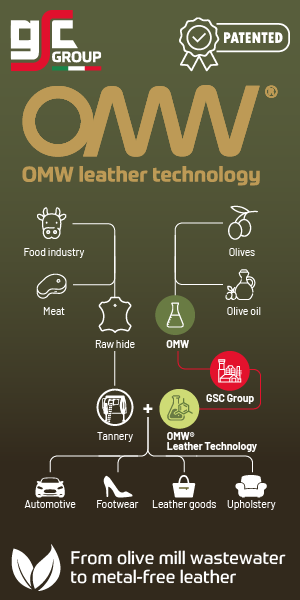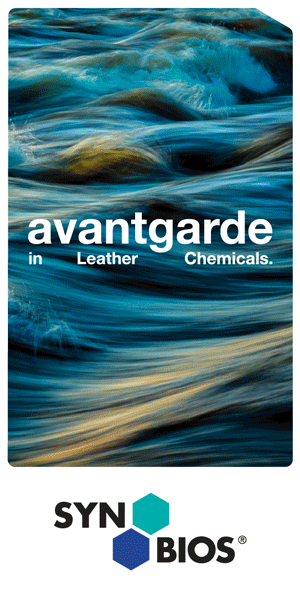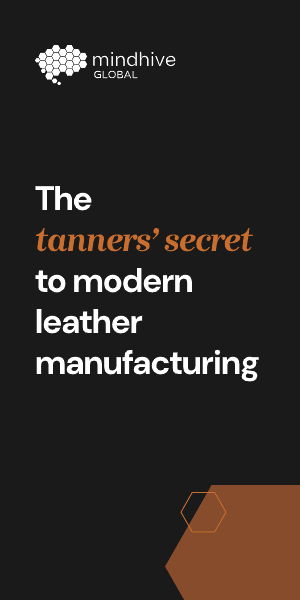Mission possible

This year, 2021, marks marks the 200th anniversary of leather chemicals group Smit & Zoon. In this interview, Marc Smit, the seventh-generation owner of the business, reflects on what it takes to keep a company going for so long and on the mission of helping to make the leather value chain sustainable by 2025.
From comments you have made in recent years, it’s clear that it means a lot to you, personally, for Smit & Zoon to reach the important milestone of 200 years in business. What would you say are the main reasons why Smit & Zoon, specifically, has been able to continue for so long?
Customers always ask about this, how we have lasted for such a long period, surviving two World Wars and a number of other crises. Well, you have to be lucky at times, but I think you can increase the chances of success by looking more long-term, focusing on things that you think will happen in ten or 15 years’ time. I, as was my father, was raised with the thought that a family business is not something you own. It’s something you get as a loan. You have to take care of it, but your duty is to pass it on in the most successful way possible to the next generation. That means thinking about the challenges and opportunities that will come across our paths in the next 20 or 25 years. That forces you to think constantly about how to overcome those challenges and how to make the most of the opportunities. I think that helps drive a business.
In what ways did studying economics prepare you and help you before taking up a lead role in running the company? What are the aspects of running a global company that your studies prepared you for less well?
Well, it was quite a long time ago, but what I remember is that they taught me how to run a company by the numbers and how to improve the numbers. And that helped because it gave me confidence from the beginning from a financial point of view. But there’s so much more than only theory, you really learn by doing things yourself. I think you can increase the chances of success through many different factors that you do not learn at university.
What would you tell students and young entrepreneurs today that your teachers did not tell you?
As I’m a seventh-generation company owner, I have seven pieces of advice for young entrepreneurs and students. First, you have to be hard on your own opinions. You have to stay critical. I have often been confronted by arguments why certain ideas would not work. People have a tendency to stay in their comfort zone; they want to do the things they’ve always done. It’s important to challenge them and take them out of the comfort zone and you should lead by example. You should go out of your own comfort zone. Second, you should always search for the best people, people who will take ownership and help you grow, people who will challenge you. Good people want freedom and they want to decide things, but this can help you achieve the growth you are looking for. Third, you should be a teacher; you should share your ideas and you should repeat what you say rather than say it only once. Fourth, you should respect people who have less power than you do. This is a value I care a lot about. I don’t care how important you are; I judge you on how you treat people who are less powerful. Five, stick with your values and make sure everybody in the company shares those values. If there are people who do not, get rid of them because they will ruin your company and everything you stand for. Six, don’t rush and don’t panic because you will soon be dead anyway. Take a moment and do not kill long-term goals unless you have proof that they are wrong. Otherwise, keep faith that the things you started are the right ones. And seven, look for people like you outside your company and share with them the things you struggle with. It’s not only about business, it’s about personal and family affairs too. I joined an organisation called Entrepreneurs Organization (EO) 12 years ago and I am still learning every day from that experience. We share experiences of family, personal and business life. The nice thing about it is that it’s very important that you only share experiences. You don’t share your opinion; that’s not valuable.
You will know very well that in Japan there is a high regard for businesses that have been running for a long time and that there is even a word, ‘shinise’, for companies that have that status. It may come as a surprise to see Nintendo’s name among the ‘shinise’, but long before video games were thought of, Nintendo was a successful manufacturer of playing-cards. Its transition happened at just the right time. Smit & Zoon’s transition to specialty chemicals for leather came relatively recently, in the context of 200 years’ history. Was this a difficult decision at the time? What made this move successful?
I have a picture from the early 1950s of our first [exhibition] stand in Utrecht in Holland and we’re showing some products for leather. But it was at the end of the 1960s when it really developed strongly. The reason why we decided to enter the leather industry was that our core business at that time, cod liver oil, was coming to an end. The pharmaceutical industry was starting to produce vitamins. Vitamins became way more popular than cod liver oil, which tasted horrible. Thinking ahead ten or 15 years about what would be the next challenge and opportunity, we began looking at other industries. One of those industries was leather, which was already using a lot of fish oil at that time. It was cheap and it made very soft leather, so it was a logical step with the products we were selling to enter a new market and a growing market for us at the time.
What has the acquisition of Codyeco in 2017 meant for Smit & Zoon?
It has been important and the reason for that relates to the mission that we already had in place. The mission is to have a sustainable leather value chain by about 2025. This is what we are aiming for and Codyeco gave us a stronger presence in luxury shoes and leather articles. It has given us a better understanding of the needs of the fashion industry and therefore it fits in well with our mission. With their help and their contacts we are better able than before to start a discussion with the customers of our customers.
What is your view of the leather chemicals industry in general in 2021?
Well, I think the leather chemical industry is in a critical phase now. We need to come up with ideas and solutions to contribute to [presenting leather as] a sustainable material. In my opinion, leather is under threat. The current situation doesn’t help, with shortages of raw materials and tremendous price increases all around the globe. Price increases for chemicals don’t help us as the value chain still has this very strong focus on costs. We should take care to improve our value chain in order to be able to produce the most sustainable material available. It’s possible to do that, especially when you take into consideration the benefits leather has as a product compared to the plastic alternatives. So it’s a difficult period now, I think, for everybody. We really need to change. Change is needed to make it [leather] a sustainable product for the future.
Last year, at the time of the launch of Nera and Zeology, Smit & Zoon talked about this being the start of “an era of truly sustainable leather manufacturing”. What obstacles do you see on the path towards that goal?
I think there are many obstacles, but most of your readers will probably know this already. I think most of the obstacles are related to the negative information you can read about leather. This makes people think negative thoughts about leather. I prefer always to talk about opportunities rather than obstacles. Talking about obstacles won’t help us. The opportunity is that we have a fantastic by-product that can be turned into a fantastic, sustainable piece of material. That’s the challenge we have and it’s the whole value chain that has to deal with it. We must do it together, not only we as chemical suppliers; we have our own duty, but we need the whole chain for it to really change. If we do that, then we solve the challenges we are facing and we can start promoting the beauty of leather. Then I see a really good future ahead.
Something else we know from paying close attention to what you have said in recent years is that passing on a healthy, prosperous, successful business to the eighth generation and beyond is very important to you. What are the characteristics that Smit & Zoon will need to have in place for you to pass the baton on with confidence?
We need to continue to work on our mission and to make the leather value chain sustainable. We have to work on our own goals to support the industry by bringing chemicals or solutions to the market that have a minimum impact on the environment. We are making efforts to support the whole chain, but we need support to make it happen. This [leather chemicals] is the part we can influence and we are investing heavily. I’m very confident that I can pass the baton to the eighth generation. In the end we are also dependent on end-consumer behaviour, right? They also need to value the beauty of leather and see it as a fantastic, sustainable by-product. When you look at recent statistics that show that 60% of young people in Europe still believe that cows are being killed for leather, it shows that we still have a long way to go. If we only talk among ourselves saying we don’t understand why companies don’t use leather because leather is way more sustainable, it doesn’t help us in the end. Brands in the car industry sell cars, they do not sell leather, but they will sell leather if their end consumer asks for leather. Our aim should be to convince the end consumer that leather is a fantastic product. That is a big challenge. If 60% of the younger generation in Europe think cows are killed for leather, it’s completely the wrong starting-point. That’s why we want to play a catalysing role and not just focus on chemicals. Our sustainability manager, Egbert Dikkers, plays a role in Leather Naturally. We support that because we think it’s important that we invest in this. Leather Naturally is a good tool for promoting leather, especially to younger people.
Man with a mission. Marc Smit wants the whole leather value chain to be sustainable before he passes on the Smit & Zoon baton.
All Credits: Smit & Zoon





























